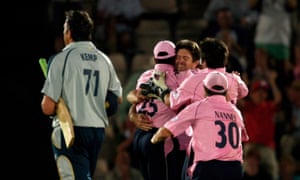My favourite game: Middlesex v Kent, 2008 Twenty20 final | Sport
When you write about sport for a living, you don’t watch it the way you used to. Subconsciously, you’re documenting: actively remembering, noticing your surroundings, checking in with your sensations, emptying the tableau of details.
Once you’ve been doing this long enough, the process of active remembrance is one that occurs whether you’re watching for work or for fun; whether you want it to or not.
This sounds depressing but it isn’t really: no more depressing than the synaesthete who sees colours when hearing music, or the child who sees shapes in the clouds. All the same, occasionally you yearn for the days of sport not as the possibility of something else but as its own discrete, intoxicating end. Days like 26 July 2008 and the climactic over of Middlesex v Kent. I was 22 years old.
The first thing you need to know is that until 2008, Middlesex were not very good. It had been 15 years since their previous trophy of any kind. The second thing you need to know is Middlesex are still not very good. They haven’t reached a Lord’s final since 1990. Twelve years on from that miraculous night in 2008, they haven’t come remotely close to repeating it.
Partly, of course, this was a function of those lawless, lurching early years of 20-over cricket: an age of blind experimentation in which any side with a little foresight and fortune could suddenly catapult themselves to the front of the pack. And what a strange team it was: an uneven assortment of wizened veterans (Shaun Udal, Murali Kartik), callow youngsters (Billy Godleman, Dawid Malan), overseas mavericks such as Dirk Nannes and Tyron Henderson, who may well have been the most mercurial of the lot: a journeyman South African all-rounder who rose largely without trace and disappeared much the same way. To this day, I’m still not entirely sure he existed.
But here he reigned with deific cool. After dispatching Durham in the semi-final with a crushing 59 off 21 balls, his calm 43 off 33 in the final – embellished by Owais Shah’s late blitz of 75 off 35 – helped Middlesex to a formidable score of 187. But Kent started strongly. Rob Key and Joe Denly slammed a brisk 89 in nine overs. Justin Kemp and Darren Stevens continued to hew away. By the time Stevens was caught in the deep, Kent needed 16 from the final over. Henderson would bowl it.
Sixteen from six became 10 from four. Kemp shovelled the ball down the ground for two runs. Malan ran around to cut it off. At which point the ball disappeared: falling to earth 80 yards away, hurtling towards the fine-leg boundary: an astonishingly wild throw that very nearly cost the match. As Kent fans danced tipsily in the aisles, the batsmen took two overthrows.

And now, with four runs needed from two balls, Henderson settled matters. A perfect leg-cutter past Kemp’s outside edge produced a dot ball. With four required off the last delivery, he found the block-hole, fielded the ball himself, and whipped off the bails with a theatrical flourish.
It could easily have been the beginning of something. I think I knew, even then, that it was really an end. The inaugural Champions League would be cancelled as a result of the Mumbai terror attacks. The subsequent Stanford Series would descend into embarrassment. The victorious 2008 squad would be broken up. With devastating swiftness, Middlesex would return to the foothills of T20 mediocrity, where they have remained ever since.
For your correspondent, screaming himself hoarse in the Rose Bowl stands, it was a similarly liminal moment. The days of student Arcadia were over; the world of work and adulthood, of loan repayments and global recession, of sport not simply as barbaric passion but as career and livelihood, were close at hand. Maybe, on reflection, this wasn’t my favourite game after all. Maybe 22 was just my favourite age.
